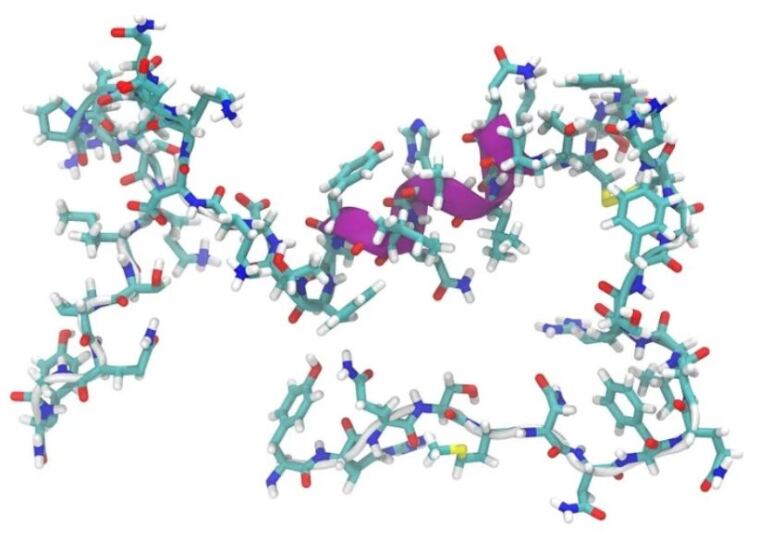- Like
- SHARE
- Digg
- Del
- Tumblr
- VKontakte
- Flattr
- Buffer
- Love This
- Save
- Odnoklassniki
- Meneame
- Blogger
- Amazon
- Yahoo Mail
- Gmail
- AOL
- Newsvine
- HackerNews
- Evernote
- MySpace
- Mail.ru
- Viadeo
- Line
- Comments
- Yummly
- SMS
- Viber
- Telegram
- JOIN
- Skype
- Facebook Messenger
- Kakao
- LiveJournal
- Yammer
- Edgar
- Fintel
- Mix
- Instapaper
- Copy Link
Introduction
Peptides developed and generated in a lab are known as synthetic peptides. They are generated by chemically joining amino acids in a certain order, which enables researchers to make unique peptides with the appropriate qualities.
These peptides can be altered to increase stability, target particular receptors, or mimic the structures of natural proteins. Synthetic peptides have become potent instruments for treatments, diagnosis, and drug discovery.
Methods of Production
There are two main ways to make synthetic peptides: liquid-phase peptide synthesis (LPPS) and solid-phase peptide synthesis (SPPS).
The most popular technique, SPPS, involves gradually constructing the peptide chain on a stable support. This technique makes the effective synthesis of lengthy, complicated peptides possible.
On the other hand, LPPS uses solution-phase peptide synthesis and is appropriate for shorter peptide sequences.
Applications of Synthetic Peptides
Drug Discovery and Development
By acting as useful tools for locating and confirming novel therapeutic targets, synthetic peptides have transformed the field of drug discovery. Large libraries of compounds can be screened using them, assisting in creating new medicinal medicines. Peptides may also be created to target particular protein-protein interactions, hence obstructing disease-related pathways.
Therapeutics
The potential of synthetic peptides in treatments is being investigated increasingly. They can be created to replicate how natural peptides control different biological processes.
For instance, drugs based on peptides have been developed to treat diabetes, cardiovascular disease, and cancer. A potential possibility for antimicrobial treatment, synthetic peptides can target and harm bacterial cell membranes.
Diagnostics
Due to their great specificity and affinity for certain biomarkers, peptides can be utilized as diagnostic instruments. They can attach to particular proteins or antibodies, making identifying and measuring illness signs possible. Infectious diseases, cancer, and autoimmune disorders are among the ailments for which synthetic peptide-based diagnostic tests are being developed.
Personal care and cosmetics
Synthetic peptides are used in the cosmetic industry. Collagen fragments and other peptides can increase the creation of collagen, improving skin suppleness and minimizing wrinkles. To stimulate hair development and enhance the general condition of the hair, peptide-based formulations are also utilized in hair care products.
Benefits of Synthetic Peptides
Stability and Bioavailability
The stability and bioavailability of synthetic peptides can be enhanced. Enhancing peptide half-life, lowering sensitivity to enzyme degradation, and enhancing cell penetration are all possible through chemical changes. These adjustments increase the likelihood of successful drug distribution and therapeutic efficacy.
Safety
Biologically compatible with the human body, peptides produced from endogenous proteins are typically considered safe. The positive characteristics of natural peptides can be preserved in synthetic peptides while undesired side effects are eliminated. They are promising prospects for therapeutic applications due to their low toxicity and biocompatibility.
Cost-Effectiveness
Synthetic peptides can be made relatively cheaper than conventional small-molecule medications. Peptide-based medicines are now more widely available and reasonably priced due to improvements in peptide synthesis processes that have enhanced productivity and decreased manufacturing costs.
The Takeaway
In several scientific fields, synthetic peptides have become potent tools with enormous potential for therapies, diagnostics, and drug development. The degree to which synthetic peptides can be customized is unmatched.
Scientists can create peptides with customized amino acid sequences to target specific receptors or mimic natural proteins. This adaptability enables the creation of powerful and highly selective peptide-based medications. For clinical research, researchers can buy peptides from the top manufacturers.
About Theresa Duncan
Originally from Detroit, MI, Theresa has been offering health and fitness advice for the last 30 years while working as an engineer. She decided to turn her passion into a profession, and finds nothing more satisfying than helping others reach their health and fitness goals.

